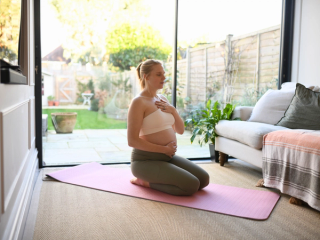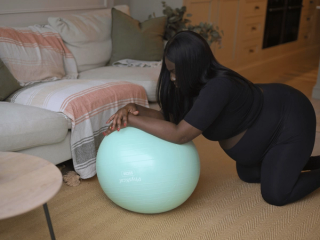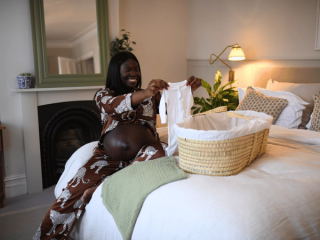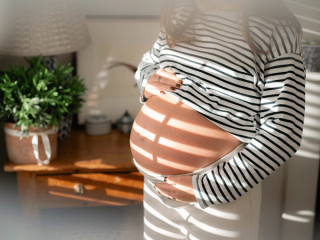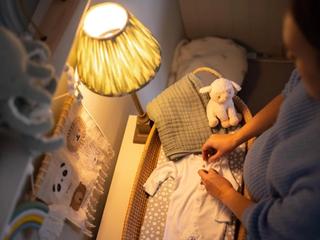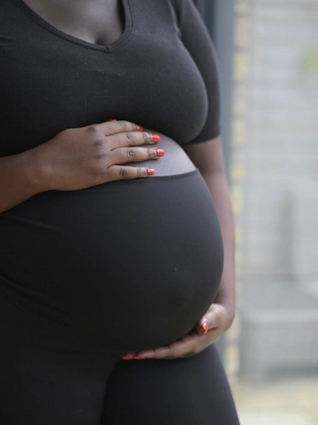
- Home
- Advice And Support
- Pregnancy
- Labour & Birth
- Braxton Hicks Contractions
Everything You Need to Know About Braxton Hicks Contractions
Learn about Braxton Hicks contractions, when they start, how they feel, and how to tell them apart from real labour.
What are Braxton Hicks contractions?
Well, you have navigated the pregnancy sickness, managed the heartburn, worked out the quickest route to every toilet in the county and apologised to your partner for your mild mood swings! Then, just when you are finding your pregnancy stride, you feel a strange sensation in your tummy and find yourself worrying you may be going into labour…
From quite early on in your pregnancy your uterus will tighten and relax without you even knowing it is happening. This can begin as early as six weeks of gestation. However, it is not usually until the second or third trimester that women report feeling a tight sensation across their abdomen and may experience Braxton-Hicks contractions.
Often referred to as “practice contractions” the term Braxton Hicks originated when, in 1872, Dr John Braxton Hicks spoke about the difference between the female body preparing for labour and the female body actually experiencing meaningful contractions.
Many pregnant women wonder ‘When do braxton hicks contractions start?’ and it varies a lot between women. Some people experience these contractions, on and off, throughout their pregnancy from 12-13 weeks, but this is not common, and some people don’t experience them at all. Braxton-Hicks contractions most often occur in the later stages of pregnancy, particularly towards the end, which can be confusing.
What does a Braxton Hicks contraction feel like?
What do Braxton Hicks contractions feel like? They’re usually described as “not painful” but pregnant women do sometimes seek reassurance as the sensation can feel quite intense, unfamiliar and uncomfortable. Braxton Hicks contractions will usually come and go, with no obvious pattern to them. While they can be felt as early as the second trimester, they’re not usually very painful, but more uncomfortable.
While there is no certain answer for how long Braxton Hicks contractions should last, they are usually short lived, lasting less than 60 seconds and can stop very quickly. If you place your hand on your abdomen when you feel the beginnings of this tightening, you should feel the uterine contraction starting at the top of your tummy and slowly spread across your whole tummy.
What causes Braxton Hicks contractions?
Some obstetricians believe that Braxton Hicks contractions help to prepare the uterus, which is a muscle, to prepare for the work of labour. In addition, this activity could be helping the blood flow to the placenta. That said, there are thought to be some situations that can bring on practice contractions, these include:
- Increased activity of mum or baby
- A full bladder – this can put pressure on your uterus resulting in discomfort.
- Dehydration – you should be aiming to drink at least 1.5 litres of fluid per day
- Following sexual intercourse – sex prompts the release of oxytocin which causes muscle contractions. In addition semen contains a hormone called prostaglandin, which is also thought to promote contractions.
- Being unwell
What is the difference between Braxton Hicks and the real deal?
Knowing the difference between Braxton Hicks and contractions will provide some reassurance for understanding if it is the start of true labour or not. Firstly, Braxton Hicks contractions are irregular and do not become progressively more frequent, whereas labour contractions follow a regular, predictable pattern and become closer together over time. Braxton Hicks contractions remain mild and do not grow stronger. This is unlike labour contractions, which steadily increase in intensity and duration. Braxton Hicks contractions are typically felt in the front of the abdomen, whereas labour contractions often begin in the lower back or abdomen and may resemble intense period pains. Finally, a change in activity or position can often help ease or stop Braxton Hicks contractions, while true labour contractions will continue regardless of movement or position changes.
Unless you are experiencing preterm labour, contractions won’t start until after 37 weeks. They may initially be quite far apart but the gaps between contractions will get shorter and shorter. Your contractions will build like a wave, lasting up to 70 seconds, and become stronger as labour progresses.
What can I do to help relieve Braxton Hicks contractions?
Although there is no guaranteed way to stop your Braxton Hicks contractions, changing position, resting and rehydrating are known to be the best things to try to relieve Braxton-Hicks. If you have been standing or sitting for a long period of time, have a move around. Equally if you have been laid down and are uncomfortable, try a change of position. Make sure you are well hydrated. Braxton Hicks can be related to dehydration, so this may help relieve them. Trying to rest and relax is encouraged, such as taking a warm bath, having a massage, or having a nap.
When should I call my midwife?
Hopefully you have attended some great antenatal classes and you feel prepared for navigating the early hours of labour, but, if at any point in pregnancy you find yourself a little uncertain or worried, it is always a good idea to run things past your midwife.
If you are unsure if your Braxton Hicks have turned into real contractions and are less than 37 weeks along, give your midwife a call.
If you experience any of the following contact your maternity unit straight away:
- Bleeding
- Reduced fetal movements
- Waters breaking
- Feeling unwell
- Abdominal pain
Remember, Braxton Hicks contractions will come and go and vary in length and strength. If you find you have two or three contractions in quick succession and then nothing for another few hours, these are Braxton Hicks. Eventually, the balance will tip the scale and practice contractions will no longer be needed as you progress into established labour.
FAQs about Braxton Hicks
Do Braxton Hicks mean labour is near?
Experiencing Braxton Hicks contractions does not necessarily mean labour is imminent. They are simply your body’s way of preparing for birth. You may start feeling them as early as the second trimester, which could be weeks or even months before labour begins.
What are the triggers for Braxton Hicks?
Triggers for Braxton Hicks include being active or dehydrated. Some women are simply more prone to experience them. Being later in your pregnancy can also trigger them as they are more likely to occur later on.
How early do Braxton Hicks contractions start?
Braxton Hickscan begin as early as the second trimester but are most commonly felt in the third trimester. Some people do not experience them until just before labour, so if you haven’t noticed them yet, there’s no need for concern.
Does baby move during Braxton Hicks?
During Braxton Hicks contractions, the muscles of your uterus tighten, causing the top of your uterus to feel firm. In contrast, baby movements feel more like fluttering, kicks, or jerky motions. You can check by feeling the top of your uterus—if it feels firm all over, it’s likely Braxton Hicks; if there are softer areas, it may be your baby moving.
Is it normal to have Braxton Hicks contractions all day?
Some women do experience a lot of Braxton Hicks contractions and might have them on and off all day. They typically last less than 30 seconds and may happen more as you approach the end of your pregnancy.
